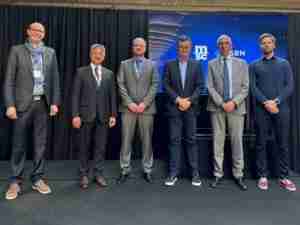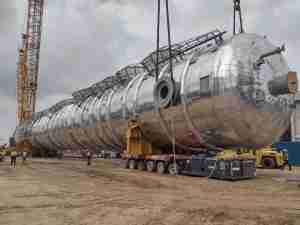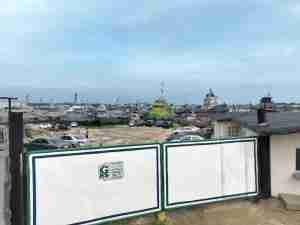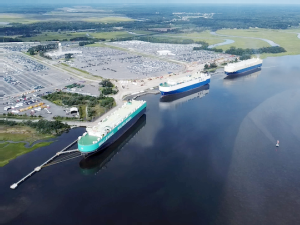Project members committing to take voluntary efforts at reducing diesel emissions included private entities such as fuel providers, trucking companies, and garbage and recycling haulers; public entities such as the Port, the Oregon Departments of Environmental Quality and Transportation, the City of Portland, and Multnomah County health department; and non-profit organizations such as Environmental Justice Action Group, Coalition for a Livable Future, and Oregon Environmental Council.
'For a number of years, the Port has been proactively working to reduce emissions from on-road and off-road vehicles,' said Wyatt. 'Joining this group and declaring our joint commitment to voluntarily reducing emissions is a great step for the Port, because we can have a bigger impact by working together.'
The Declaration of Cooperation is a 'written handshake', putting forth solutions agreed to by the group. The proposed solutions will focus on voluntary actions that can be achieved without regulatory intervention. Government agencies and community groups will support the diesel reduction efforts by securing grant money from federal and state programs and participating in outreach efforts.
The Port has already taken a number of steps to reduce air emissions:
- Reduced airport parking idling time by 50 percent by implementing the 'Quick Pay' automated parking toll plaza in 2005
- One of the first organizations in Portland to begin using Ultra-Low Sulfur Diesel Fuel and is voluntarily using it in Port marine terminal equipment instead of off-road diesel fuel
- Increased the percentage of the Port fleet that runs on alternative fuels and purchased a number of hybrid and alternative fuel vehicles
- Started using biodiesel B20 in PDX diesel vehicles in 2002
- Began replacing diesel busses with Compressed Natural Gas (CNG) buses for PDX's passenger transport fleet in 2001 ' currently have six CNG busses
- Purchasing Renewable Power from PacifiCorps' Blue Sky energy program and Portland General Electric's Salmon-Friendly and Clean Wind Power program since 2001
The parties signing the Declaration of Cooperation committed to:
General Principles
- We agree to approach problems with humility and adaptability. We will inevitably make mistakes and we will learn from these mistakes, make corrections, and not place blame.
- We recognize that we each have a unique perspective and contribution to make, whether it is expertise, labor, money, in-kind services, etc.
- We recognize that we must endeavor to involve any person or group who could help or hinder us to achieve our goals.
- We agree to focus on taking incremental 'do-able' steps towards success.
Ground Rules
- We recognize that the best outcome depends upon cooperation and collaboration by all entities at the table.
- We commit to openly communicate ideas, potential contributions, and concerns, and also commit to engage in respectful, active listening to each other.
- We are willing to creatively explore solutions.
- We agree to commit to the agreed-upon solution, in whatever way we can. If we, individually, are unable to make a commitment for our organization, we will work to identify the person that can and determine if the commitment is possible.
- We commit to building trust by doing what we say we will do, over and over.
- We agree to notify each other before taking outside actions that might impact the process. (This does not mean that we will provide information that it would be inappropriate to share in a public venue.)
- We agree that everyone shares in the solution, everyone shares in the credit.
- The convener and project staff commit to ensu










